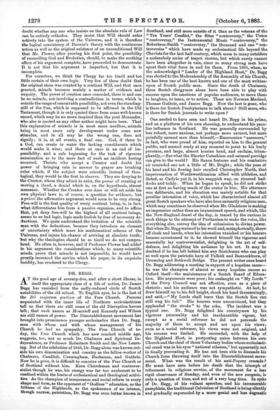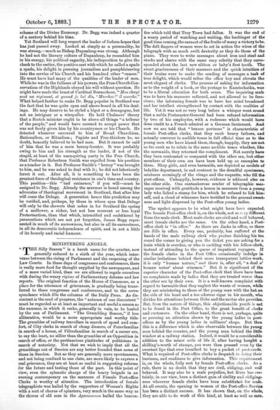DR. BEGG.
AT the good age of seventy-five, and after a short illness, in itself the appropriate close of a life of action, Dr. James Begg has vanished from the sadly-reduced circle of Scotch notabilities of the old school. To English eyes, he is the last of the Dii majorum gentium of the Free Church. Persons acquainted with the inner life of Northern ecclesiasticism tell Us that there are still some of the old Disruption heroes left ; that such names as Moncrieff and Kennedy and Wilson are still names of power. The Disestablishment movement has brought into prominence younger ecclesiastics than Dr. Begg, men with whom and with whose management of his Church he had no sympathy. The Free Church of to- day, the Free Church which has now reached middle age, suggests, too, not so much Dr. Chalmers and Spiritual In- dependence, as Professor Robertson Smith and the New Learn- ing. But of the celebrities of 1843, Dr. Begg alone was known out- side his own denomination and country as the fellow-worker of Chalmers, Candlish, Cunningham, Buchanan, and Guthrie. Now he is gone, it is difficult to conceive of the Free Church or of Scotland without him. Keen Churchman and controver- sialist though he was, his energy was far too exuberant to be confined within the limits of ecclesiastical and theological activi- ties. As the champion of temperance and social reform in every shape and form, as the opponent of " Godless" education, as the tribune of the Highlands, as the spokesman of an intense, though narrow, patriotism, Dr. Begg was even better known in
Scotland, and still more outside of it than as the veteran of the -" Ten Years' Conflict," the Sites "controversy," the Union "controversy," the Instrumental Music "controversy," the Robertson-Smith "controversy," the thousand and one " con- troversies " which have made up ecclesiastical life beyond the Cheviots for the last half-century, which seem to many outsiders a melancholy series of teapot storms, but which surely cannot have been altogether in vain, since so many strong men have spent their vital force in and for them. From 1865, when, as the acknowledged "Leader of the Highland Host," Dr. Begg was elected to the Moderatorship of the Assembly of his Church, he has been one of the best known and one of the most written- upon of Scotch public men. Since the death of Chalmers, three Scotch clergymen alone have been able to play with success upon the emotions of popular audiences, to move them to laughter, to tears, or to action. These are Norman Macleod, Thomas Guthrie, and James Begg. Now the last is gone, who is there for Scotch Presbyterians to talk about P Still more, who is there for Scotch journals to write upon?
One needed to have seen and heard Dr. Begg in his prime, and on a platform of his own choosing, to understand his pecu- liar influence in Scotland. He was generally surrounded by less robust, more anxious, not perhaps more earnest, but more painfully earnest men than himself,—Emersonian "assessors," in fact, who were proud of him, reported on him to the general public, and seemed ready at any moment to point to his burly presence, and large, almost leonine head, and exclaim, triurn- phantly,—See what the Shorter Catechism and oatmeal porridge can give to the world ? His Saxon features and his combative air reminded one not a little of Mr. Bright ; while the pose of his head and his flowing hair recalled Christopher North, that impersonation of Wordsworthianism allied with athletics, and dieted, as Carlyle put it, in his snappish way, on rizzered had- docks and toddy. When he began to speak, he did not strike one at first as having much of the orator in him. His utterance was deliberate, and his elocution was mainly notable for that peculiar intonation of voice, which has characterised almost all great Scotch speakers who have also been earnestly religious men, which may sometimes be observed when Mr. Gladstone is making an impressive rather than an impassioned speech, and which, like the New-England drawl of the day, is traced by the curious in such things to the attempt of Puritanism to make the voice, like everything else, convey the idea of submission to divine power. But when Dr. Begg warmed to his work and, metaphorically, threw off cloak and bands, when his intonation vanished or his hearers became accustomed to it, he showed himself the vigorous and essentially lay controversialist, delighting in the art of self- defence, and delighting his audience by his art. It may be doubted if he has left behind him any Scotchman who can play so well upon the patriotic harp of Falkirk and Bannockburn, of Drumclog and Bothwell Bridge. The present writer once heard Dr. Begg addressing a meeting in support of a hopeless cause— he was the champion of almost as many hopeless causes as Oxford itself—the maintenance of a Scotch Board of Educa- tion. His arguments were poor; his onslaught on "My Lords" of the Privy Council was not effective, even as a piece of rhetoric; and his audience was not sympathetic. At last, he drew himself up to his full height., shook his head threateningly, and said,—" My Lords shall learn that the Scotch lion can still wag his tail." His hearers were unconvinced, but they applauded "the stroke" to the echo. The incident was a typical one. Dr. Begg delighted his countrymen by his vigorous personality and his inexhaustible vigour, but except as a social reformer he did not persuade the majority of them to accept and act upon his views ; even as a social reformer, his views were not original, and his success was limited. He succeeded, with the help of the Highland Host, in postponing union between his own Church and the chief of those Voluntary bodies whose ecclesiasti- cal creed was in his eyes "national atheism," but apparently not in finally preventing it. He has not been able to dissuade his Church from throwing itself into the Disestablishment move- ment- What was the result of his anti-Popery crusade P He must have seen before his death that the triumph of refinement in religious service, of the movement for a less rigid observance of Sunday, and even of the new exegesis, is only a question of time, and not of a very long time. In spite of Dr. Begg, of his valiant speeches, and his innumerable pamphlets, the traditional Calvinism of Scotland is being silently and gradually superseded by a more genial and less dogmatic
scheme of the Divine Economy. Dr. Begg was indeed a quarter of a century behind his time.
Yet Scotland will long respect the leader of forlorn-hopes that has just passed away. Looked at simply as a personality, he was strong,—much as Bishop Dupanloup was strong. Although he had not the literary culture of Dupauloup, he resembled him in his energy, his political sagacity, his indisposition to give the cheek to the miter, the positive zest with which he called a spade a spade, his delight in pressing journalism and pamphleteering into the service of his Church and his hundred other "causes." He must have had many of the qualities of the leader of men. While he was in the fullness of his powers, the Free-Church Con- servatism of the Highlands obeyed his will without question. He might have made the boast of Cardinal Bonnechose, "Mon elergi sent an regiment, et quand je lui die, 'Marches!' iZ marehe." What helped further to make Dr. Begg popular in Scotland was the fact that he was quite open and above-board in all his deal- ings. He may deserve to be styled a bigot or a demagogue, but not an intriguer or a wirepuller. He held Chalmers' theory that a Scotch minister ought to be above all things "a tribune of the people," and would have scorned to accept power that was not freely given him by his countrymen or his Church. He detested whatever savoured to him of Broad Chnrchism, Rationalism, or Ritualism; Papists and Free-thinkers he, no doubt, honestly believed to be bad men. But it cannot be said of him that he was a mere heresy-hunter. It was probably owing to him and his strength as the leader, if not of the stupid, at least of the unenquiring party in the Free Church, that Professor Robertson Smith was expelled from his position as a teacher in it. But Professor Smith's "heresy" was brought to him, and he was asked to deal with it; he did not laboriously ferret it out. After all, it is something to have been the greatest force of theological resistance in one's time and country. This position—this "bad eminence," if you will—must be assigned to Dr. Begg. Already the murmur is heard among the advocates of theological movement in Scotland, that after him will come the Deluge. A generation hence this prediction may be verified, and, perhaps, by those in whose eyes that Deluge will only be the showers that usher in for Scotland the spring of a mellower, a richer, but not less reverent or less loyal Protestantism, than that which, intensified and embittered by persecutions which are not yet forgotten, James Begg repre- sented in much of its narrowness, but also in all its earnestness, in all its democratic independence of spirit, and in not a little of its homely and racial humour.



































 Previous page
Previous page